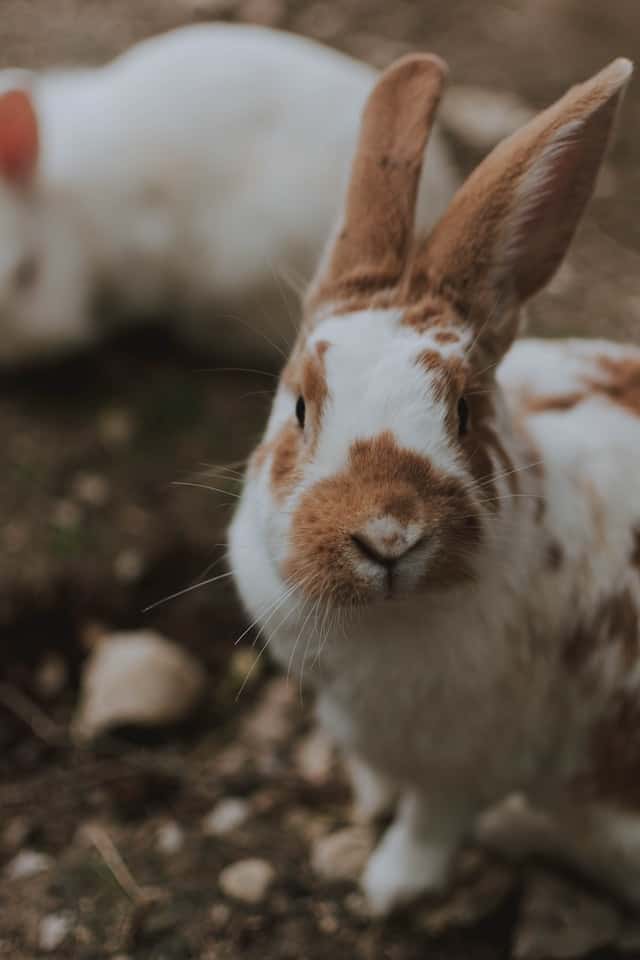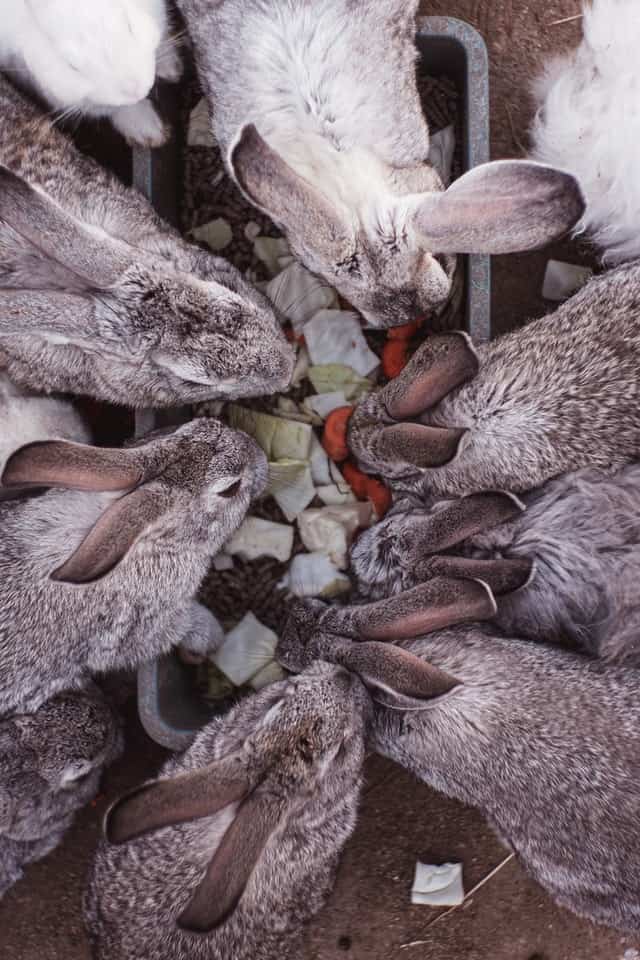Last Updated on March 17, 2023 by Marjon Ramos
About a year ago, after I moved to a bigger place, I was planning on getting another rabbit so that Tyr and Freya could have another friend (the more the merrier, right?). Then I wonder if I can get a Flemish giant or other larger breeds of rabbit.
Would that cause any problem for Tyr and Freya, who are both New Zealand rabbits? After digging through the internet for a couple of hours, I finally found the answer:
Unlike us, rabbits don’t really care or know that other rabbits are of different breed. When choosing a companion for their rabbits, rabbit owners should instead focus on the other rabbit’s personality, size, and whether or not it is neutered.
In this article, I will be talking about whether or not two different breeds of rabbits can live together. I would also talk about the benefits and downsides of having two different breeds of rabbits living together, and more.
So without further ado, let’s get started.
Table of Contents
What breeds of rabbits live well together?
The breed of your chosen rabbits doesn’t really matter when it comes to them living together. What matters is the rabbit’s personality.
Just like us, different rabbits have different personalities. Some are dominant, while others are submissive.
Their personalities should closely match for a higher chance of bonding.
Make sure to ask the rescue (if your rabbit is bought, ask the staff) about the temper of your chosen rabbits.
Another important factor that would determine whether the two rabbit could live with each other is whether or not both of them are neutered.
Unneutered rabbits tend to be more aggressive due to hormones and can fight with other rabbits.
Also, rabbits’ ages should be close to one another. Younger rabbits tend to be more playful and random, while older rabbits prefer to just chill. This could irritate the older rabbit and cause a fight, depending on its personality.
Finally, if your space or the rabbit’s cage is small, pick a breed that’s appropriate. Cramping a mini lop with a Flemish giant in a small cage would stress both of the rabbit.
At what age can you bond rabbits of different breeds?
When bonding your rabbits, their age doesn’t matter much. What matters is whether or not both rabbits are neutered and if their personalities match.
While age can affect the rabbit’s personality (old = more chill, young = playful), what ultimately matters when choosing a companion for your rabbit is your rabbit’s temper and personality.
Older rabbits tends to prefer to be left alone. They would sometimes get angry if disturbed, or if someone is close to their territory.
While young rabbits tends to be more playful and random.
If this is the case with your rabbits, try to separate them until the younger rabbit is a bit older. Or better yet, choose a rabbit that closely matches your rabbit’s age if you can’t find an older rabbit that’s not territorial.
Can different breeds and genders of rabbits live together?

Yes, different breeds and different genders of rabbits can live together as long as both rabbits are neutered. Rabbits don’t discriminate by breed, so as long as both of them are rabbits, they can become lifelong companions.
The only concern when bonding different breeds and genders of rabbits is whether or not you want to have kits later on. If not, make sure that you get them neutered first to ensure that this will not happen.
Remember that rabbits are fertile between 8 and 12 weeks, but should wait until 6 months old to be allowed to breed for better results.
Neutering also lessens the destructive behaviors of rabbits due to hormones.
What are the benefits of different breeds of rabbits living together?

There are no direct benefits to different breeds of rabbits living together. Rabbits don’t care if their companion has a different color or breed.
What rabbits really care about is having a companion. Rabbits are social creatures and require constant social interaction to be happy and healthy.
What’s the drawback to different breeds of rabbits living together?

One drawback is the rabbit’s size, especially if your cage is small. Rabbits need a lot of space to be happy and healthy.
This size difference is especially important to look out for when one of the rabbits is territorial. This could cause a fight, especially if one or both rabbits are unneutered.
Cramping a mini lop with a Flemish giant causes a problem due to their size difference. This could be fixed by having larger cages or separating the two rabbits entirely if one of the rabbits is aggressive.
How to safely bond different breeds of rabbits?

Bonding different breeds of rabbits is the same as bonding rabbits that are of the same breed. What’s important is whether or not both the rabbits are neutered and their personalities.
Neutering both rabbits, regardless of the breed, would ensure that hormonally related aggression would not happen. Also, if your rabbit is a rescue or bought, it’s a good idea to ask the staff about the rabbit’s personality.
Some rabbits, even neutered, are territorial and will still fight other rabbits if they get close to their home or food. If your intention is to find a companion for your rabbit, pick a rabbit that’s more friendly.
Summary
Rabbits don’t care whether or not the other one is of different breed. What matters is the other rabbit’s personality, size, and whether or not it’s neutered.
Neutering is important. It could reduce or remove the rabbit’s hormonal-related behaviors like fighting, regardless of breed.
The size of the rabbit is also important because if the owners have limited space, having a Flemish giant and a mini lop could cause a problem. Every rabbit needs their personal space.
And lastly, before getting your rabbit’s companion, ask the staff about the other rabbit’s personality. Even neutered rabbits can get territorial and aggressive if that’s their personality.
Cite this article:
Related Articles
- Can Rabbits Eat Asparagus? 9 things you need to know.
- Can Rabbits Eat Tomatoes? What You Need To Know.
- Can Rabbits Eat Watermelon? What You Need To Know.
- Can Rabbits Eat Grapes? What You Need To Know.
- Can Rabbits Eat Broccoli? What You Need To Know.
- Can Rabbits Eat Apples? What You Need To Know.
- Can Rabbits Eat Cabbages? What You Need To Know.
- Can Rabbits Eat Strawberries? What You Need To Know.
- Can Rabbits Eat Bananas? What You Need To Know.
- Can Rabbits Eat Oranges? 9 things you need to know.
- Can Rabbits Eat Blueberries? Here’s Why.
- Can Rabbits Eat Spinach? Your Questions Answered.
- Can Rabbits Eat Cucumbers? Here’s Why.
- Can Rabbits Eat Celery? What you need to know.
- Can Rabbits Eat Radishes: Everything You Need To Know
Sources and further reading
- Buseth, Marit Emilie., and Richard A. Saunders. Rabbit Behaviour, Health, and Care. CABI, 2014.
- Lebas, F. The Rabbit: Husbandry, Health, and Production. Food and Agriculture Organization of the United Nations, 1997.
- Patry, Karen, et al. The Rabbit-Raising Problem Solver: Your Questions Answered about Housing, Feeding, Behavior, Health Care, Breeding, and Kindling. Storey Publishing, 2014.




